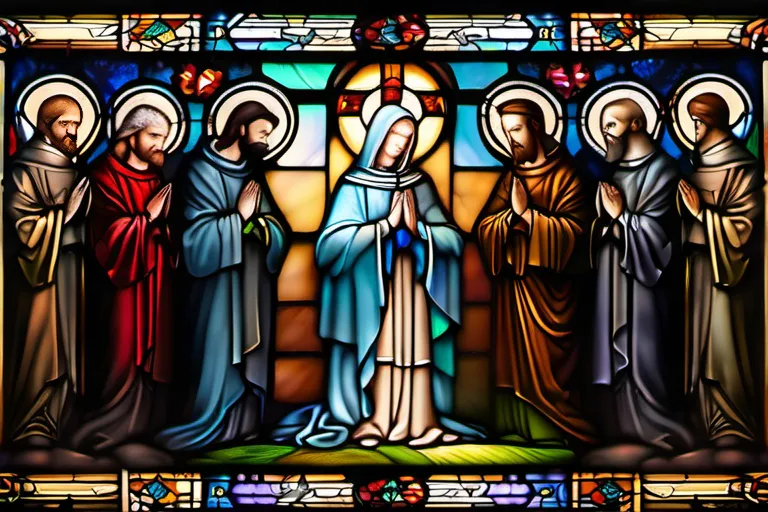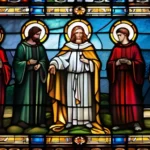Exploring the significance, history, and veneration of saints within the Christian faith.
Saints are revered individuals who have lived exemplary lives according to Christian teachings. This article delves into their role, importance, and the various ways they are honored in Christianity.
The Origin and Evolution of Sainthood
How did the concept of sainthood come to be such a pivotal part of Christianity? The journey of saints from their earliest origins to the present day is as fascinating as it is complex. Let’s dive into the historical roots and evolution of this practice.
The idea of sainthood, or canonization, has its roots in early Christian communities where individuals were recognized for their exemplary lives and deep faith. Initially, these saints were not formally designated but rather revered by the community as models to emulate. Over time, formal processes began to develop, with the Church gradually establishing criteria and procedures for recognizing saints.
One cannot help but wonder: what criteria did the early Church use? Were they purely based on miracles, or was it a combination of moral excellence and spiritual devotion? These questions have led scholars to explore the ‘mystical aura’ surrounding the canonization process. It’s like weaving together threads of legend and faith to create a tapestry that both honors the saint and inspires believers.
The criteria for canonization evolved significantly over centuries, influenced by doctrinal developments and cultural shifts. For instance, in the Middle Ages, the emphasis was more on miracles performed by the candidate, while later, personal holiness became a cornerstone of the process. This evolution reflects not just changes within Christianity but also broader social and historical contexts.
Reflecting on this journey, one can’t help but marvel at how the Church managed to maintain such a dynamic yet consistent approach to recognizing saints. It’s like a living tradition that adapts to new eras while holding onto its core values of faith, charity, and devotion. This adaptability ensures that the role of saints continues to be relevant and inspiring for Christians today.
As we move forward in our exploration, it becomes clear that understanding the historical origins and evolution of sainthood provides a crucial backdrop for appreciating their significance in Christian theology and practice. The next chapter will delve into how these revered individuals continue to shape the spiritual lives of believers through intercession and guidance.
Stay tuned as we uncover more about the saints and their enduring impact on Christianity!
The Significance of Saints in Christianity
Imagine a garden, lush and vibrant, teeming with life. Now, consider each saint as a flower, unique in color and shape but all blooming in this divine garden. In Christianity, these saints serve not just as historical figures or spiritual guides but as active participants in the faith journey of believers. How can we possibly think that their role is merely symbolic? Do they not walk alongside us, offering comfort, guidance, and intercession?
Consider the intercessory function of saints. They are often invoked by Christians facing trials or seeking blessings. It’s as if these saints are whispering prayers to The Almighty, their voices blending with those of believers, creating a harmonious chorus of supplication. Do they not act like mediators, bridging the gap between humanity and God? How can we disregard this powerful role that enriches our spiritual lives?
Moreover, saints offer us examples of living a virtuous life, embodying the Biblical values in their daily actions. They are not just figures from ancient times but contemporary role models who remind us to persevere through challenges and maintain faith in difficult circumstances. Isn’t it inspiring to think that our lives can be intertwined with theirs, finding solace and strength in their stories?
The impact of saints on believers is profound. They provide comfort during hardships, inspiration during quiet moments, and a sense of community when we feel isolated. How could one not find meaning in the lives of these individuals who have dedicated themselves to God? They are beacons of hope, guiding us through life’s tumultuous journey with their unwavering faith.
In essence, understanding the role of saints is essential for grasping the depth and breadth of Christian theology. These figures, living or venerated, continue to influence our lives, offering guidance and support in times of need. Can we afford to ignore their profound significance?
Veneration and Devotion to Saints
Veneration and Devotion to Saints: Examine the various ways Christians honor and venerate saints, including feast days, shrines, and prayers.
Imagine walking through a bustling church, filled with the aroma of incense and the soft hum of prayer. The air feels thick with devotion as you see pilgrims lighting candles before statues or relics of saints. How do these acts of reverence shape our faith?
Feast days are a significant part of honoring saints. These solemn celebrations commemorate the saint’s life, death, or some notable event in their history. Why do we celebrate the lives of those who lived centuries ago? Could it be that by remembering their journeys, we find inspiration for our own spiritual paths?
Shrines are like sanctuaries within sanctuaries. These sacred spaces house relics or personal items associated with saints, drawing countless pilgrims seeking a closer connection to the divine through these holy figures. What makes a saint’s relic so powerful? Is it their mere presence that transforms a space into something more profound?
Prayers to saints are another form of veneration. Through petitions and heartfelt appeals, believers seek guidance and comfort from those who have walked before us in faith. How do these prayers work? Do the saints truly intercede on our behalf, or is it their example that guides us through life’s challenges?
Each act of veneration—from lighting a candle to visiting a shrine—speaks volumes about our belief in the power of intercession and the communal nature of faith. By venerating saints, we remind ourselves of the vast community of believers who have come before us, each with their own stories of struggle and triumph.
So next time you light a candle or visit a shrine, consider the weight of your actions. Are you merely honoring tradition, or are you partaking in a rich, living tapestry of faith that connects generations?
Famous Christian Saints Throughout History
Imagine walking through history, meeting individuals who have left indelible marks on the Christian faith—these are the saints. From the early Church to the present day, their stories inspire and guide believers. Who can forget Saint Patrick, the patron saint of Ireland? He transformed a land with a harsh reputation into one where Christianity flourished. But how did he do it?
Consider for a moment: if saints were books, what would be written in Saint Patrick’s pages? Perhaps a tale of perseverance amidst persecution, or perhaps stories of miraculous interventions that changed lives. His life is a testament to the idea that even those with humble beginnings can make significant impacts.
Saint Nicholas, known today as Santa Claus, also has a rich history. He was renowned for his generosity and kindness, often helping the poor in secret. Could it be that his legacy of giving without expecting anything in return is one of the truest forms of Christian love?
And what about Saint Joan of Arc? Her journey from peasant girl to national heroine was nothing short of extraordinary. She believed she heard voices from God, guiding her to help France during a time of crisis. Her story raises questions: Can we truly hear the voice of God in our lives? How might we respond when called upon?
Each saint’s life is like a thread in a larger tapestry. They offer lessons for modern believers—how to live with courage, how to love unconditionally, and how to face challenges with faith. Their stories remind us that even the most daunting tasks can be conquered with divine guidance.
So, as you reflect on these saints, ask yourself: How can their examples shape your own faith journey? Could there be a saint among history’s pages who speaks directly to your soul?
The Role of Saints in Modern Christianity
In modern Christianity, the role of saints has evolved from mere historical figures to living inspirations that continue to shape our faith and practices. Could it be that these revered individuals serve as guides, helping us navigate the complexities of today’s world? Think about it: how do they remain relevant in a society that often feels disconnected from spiritual traditions?
One might wonder why we still celebrate saints when many of their stories are centuries old. The answer lies in their timeless qualities—qualities like courage, compassion, and dedication. These virtues, embodied by saints throughout history, continue to resonate with believers today. For instance, Saint Thérese of Lisieux’s message of “little way” remains a beacon for those seeking simplicity and devotion.
Moreover, the veneration of saints acts as a bridge between our past and present. They remind us that even in an ever-changing world, there are universal values and principles that remain constant. By looking up to these saints, we find comfort and strength during challenging times. It’s like having a team of spiritual superheroes cheering us on from the sidelines.
But isn’t it true that saints were just people with extraordinary experiences? And don’t all Christians, regardless of their status, share in the sanctity of Christ’s spirit? Absolutely! The key lies in how we honor and learn from these individuals. Their stories teach us about perseverance, faith, and the power of prayer—lessons applicable to our own lives.
So, why not see saints as mentors rather than mere historical figures? They can guide us through personal struggles, inspire us to make a difference, and encourage us to be better versions of ourselves. After all, isn’t that what every teacher does—inspire us to reach beyond our comfort zones?
In essence, the role of saints in modern Christianity is not just about remembering their lives but integrating their teachings into our daily faith journeys. They are not just figures from yesteryears; they are living examples of what it means to be a faithful Christian today.
The Legacy of Saints: Lessons for Today’s World
Imagine walking into a cathedral, where the walls are adorned with paintings of saints, their stories etched in vibrant colors and golden hues. Could these figures from centuries past hold lessons for today’s complex world? Reflect on how saints like Martin of Tours, who shared his cloak with a beggar, or Seraphina, a slave who became a powerful advocate for the poor, continue to inspire us in modern times. How can their legacies of compassion and justice be applied to contemporary issues such as poverty, inequality, and social injustice?
Consider the metaphorical journey these saints undertook – from humble beginnings to becoming symbols of moral courage. What if we could find our own paths towards making a difference? Could the patience shown by Saint Jerome, who translated the Bible, serve as a model for understanding complex texts in today’s rapidly changing world?
The legacy of saints is not just about historical figures; it’s about the ongoing impact they have on our lives. Just as St. Francis of Assisi transformed his life and embraced nature with radical love, how can we rethink our relationship with the environment in an age marked by climate change? Could the virtues these saints embodied—like humility, peace, and sacrifice—be guiding lights for us today?
Reflect on the challenges you face. How might the example of saints who stood up against oppression or injustice inspire you to take action in your community? Are there areas where you can apply the principles of St. Joan of Arc, who courageously fought for what she believed, to contemporary struggles?
The legacy of saints is not just a chapter in history; it’s a continuous narrative that we can engage with and learn from. By drawing parallels between their lives and our own, we find not only inspiration but also a roadmap for action. Could these ancient figures become modern-day heroes, guiding us towards a more compassionate and just world?
Conclusion
 By understanding the role of saints in Christianity, we gain a deeper appreciation for the faith’s rich history and the lives of those who have followed its teachings.
By understanding the role of saints in Christianity, we gain a deeper appreciation for the faith’s rich history and the lives of those who have followed its teachings.











